I’m home from Guatemala now, happy to see my family, but sad that our fine group of sojourners is now dissipating into our individual lives again. I already miss our morning comparisons of sleep and bowel movement patterns and meals just aren’t the same without a stack of tortillas and some kind of interesting and tasty (but unrecognizable) fruit juice. On the other hand, even though it is cold here, the forecast calls for much less oppression and injustice.
But it wasn’t all oppression and injustice while we were there. I will end the "Dan's Blog Gets Hijacked by Guatemala" series with some pictures from a soccer game we attended during our stay. The Municipal Rojos (Guatemala City’s team, the Reds) played some other team that they trounced 4-0.
Here’s our happy group at the game: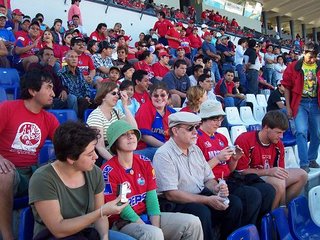
Here’s a goal that was scored: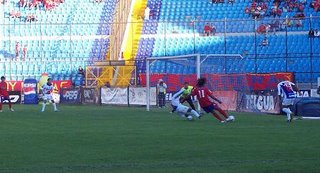
Well, to be strictly correct (and honest), a goal was not scored on this play. It is very hard to get a picture of goal in soccer. This play probably ended the way most plays do, with some player flopping on the ground in agony until a foul is called, wherein he quickly gets up and starts running again.
I must say I was a bit disappointed that there were no riots or hooliganism. As a Mennonite, I must get my violence vicariously through others. My Irish friend Ken Humphrey had entertained me all last semester with stories about the danger and excitement of attending an Irish league game, and I assumed Latin American soccer was similar. I’m told that in general it is, but this particular game featured about 10 fans for the away team and they were cordoned off in their own section, where they had nothing to cheer about for 90 minutes.
The crowd in the cheap seats across the way was trying to rile things up, though:
They were singing a song in Spanish that I couldn't quite catch the words of:
Something! Some, Something!
Some Something Something (vous?) Madre!
Enrique, a Spanish language instructor at the seminary who came with us to the game, pretended he didn’t know what they were chanting, and wouldn’t translate it for us. It seemed directed at the mothers of opposing players. I imagine it was some kind of lullaby or love song, singing the praises of all mothers of soccer players, unifying women and men in a spiritual and universal bond of motherhood and brotherhood. The tune wasn’t much of a lullaby, but remember that this is a very machismo culture, and they may have been overcompensating for their overly tender lyrics. That’s probably why Enrique was so embarrassed.
Enrique was a lot of fun though. At one point, two of the younger women in our group got up to go the bathroom and chose one that was halfway across the stadium. The suggestion came up that perhaps they wanted a better look at some of many fine looking machismos attending the game. I happened to use the phrase “on the prowl,” merely as an educational opportunity for teaching colloquialisms. Sure enough, Enrique was confused by this phrase, so I added, in Spanish, “como un Tigre.” The lights suddenly came on, and he understood how the phrase worked. In fact, he was quite enthusiastic and liberal in his use of it for the next week or so. If I accomplished nothing else in Guatemala, I was at least able to teach an extremely cool Spanish language instructor a new and apparently useful phrase, thus bridging some small part of the gap of understanding between our vastly different cultures. My work here is done.
Sunday, January 28, 2007
Goodbye Guatemala
Posted by
Dan S
at
1/28/2007
0
comments
![]()
Labels: Guatemala
Monday, January 22, 2007
Tuk Tuks, Fletes and Chicken Buses
Tuk Tuks, Fletes and Chicken Buses is my Guatemalan version of Planes, Trains, and Automobiles, except I don’t wake up next to Aaron Lehman, my bunk mate, mistaking his butt for a pillow. Aaron and I have shared many adventures over the last 3 weeks, and there is no bond quite like that of a bunk mate in a dorm setting, but every adventure has its limits.
Our story begins with the sturdy 15 passenger Dodge Ram (circa 1970?) that we have been driving around in, and which we believed could easily survive a direct missile attack: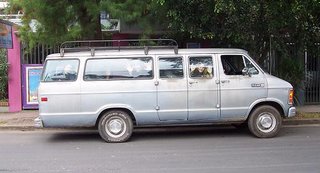
In retrospect, our confidence in the Dodge was based more on the weakness of other available vehicles than in the inherent strength of the Dodge. A group from George Fox University was here at Semilla the same time we were, and they were given use of a newer and more comfortable KIA van. However, on one of their out-of-town trips, it broke down and they had to take public buses back. They then rented a van for their next out-of-town trip, to ensure there wouldn’t be problems. That one caught fire while they were driving.
We were especially gleeful about all this, since deep down we resented that they got to zip around town in the nice van while we had to trudge along in the crappy Dodge. Thus, it seemed right for them to have van troubles. Regardless of our economic situations in our real lives, here in Guatemala they were the rich privileged kids with the shiny new uniforms and we were the ragtag group of poor kids with broken-down equipment and a drunken coach who learns to appreciate life again after he dates one of our moms. We may have had initial misgivings about our Dodge Ram, but after a few non-catastrophic outings (compared to the KIA), we learned to respect it, and eventually reached the point where we boasted of its feats of strength and endurance to any and all that would listen.
Here’s a picture of that same Dodge on the side of the road during our two day trip to Lake Atitlan, where it decided to stop running a number of times: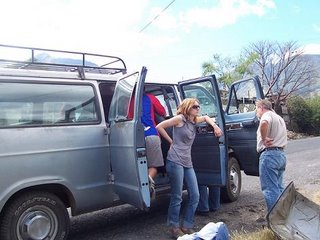
This presented a number of obvious problems for us. First, we were somewhere in Guatemala without transportation. Second, we were no longer the scrappy poor kids who won despite their hard-luck; we were now just the poor kids who got beat up with nothing to show for it. Third, we had come to believe that our fearless guide Carina (picture above) had mystical powers that protected us from any unfortunate events that might befall us, and we started to doubt her protective powers. Mostly though, we were somewhere in Guatemala without transportation.
But we had with us two first rate mechanics, Hugo, the Semilla handyman, and Saulo Padilla, our fellow student, and Guatemalan Christ-Figure (he grew up here and Knows All). We knew that if it was possible to get the van running, they would be able to accomplish it.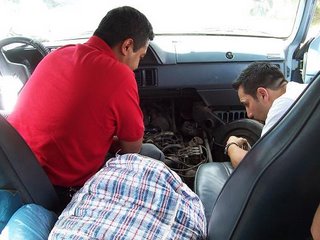
However, after messing with the engine (which is apparently in the dashboard) for a half hour or so, Carina took charge by fetching alternative transportation to the next town for lunch. Alternate transportation in this case was a “Flete”, which is basically a Toyota pickup truck with bars in the back so that people can stand up and go from one town to another, as long as the town isn’t very far. I don’t have a good picture of one from the outside, because, as in this picture, they are usually flying by at high rates of speed.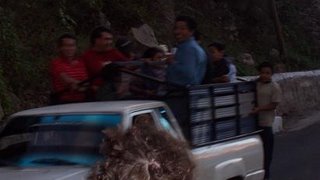
So, we all piled into one. “There is no such thing as ‘not enough room’ in Guatemala” says Carina. Here’s our ride, which was only about 10 minutes to the next town. I didn’t check, but I’m pretty sure there were not 18 functioning airbags in the back of the pickup. However, it was quite pleasant, like riding in a convertible with the top down, along with 18 of your closest friends.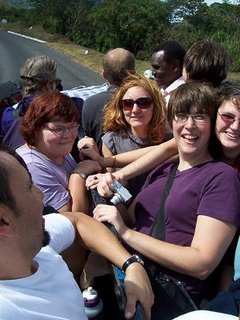
While stopped for lunch, we were surprised to see none other than our Dodge Ram resurrected from the dead, rolling into town: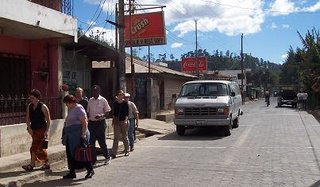
Hugo had gotten it started again. He claimed the problem was “muchos Gringos” (too many gringos). We acceded that this indeed could very well have been the problem, but we weren’t sure whether he was referring to us or the van (Dodge is of course the second most gringo make of vehicle, behind Chevy). However, we nonetheless piled in after lunch, without attempting to solve either of our Gringo problems. Predictably, the van rolled to its final resting space for the day about 15 minutes later: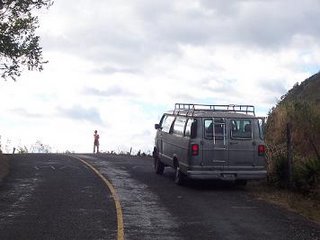
We were only a few hundred feet from the top of the hill and we considered pushing it up the rest of the way, so we could coast downhill all the way to our destination of Santiago. We even had a miniature Jessica Uhl available for directing traffic (seen standing at the top of the hill). Luckily, the normal sized Jessica keeps a mini-her in her enormous backpack for occasions just like this.
Instead, we did what any group would do in this situation – we sent Kent Yoder (not pictured) up the very steep hill (not pictured) on the left to look for the source of the avocados that were sprinkled alongside the road. Like Lewis and Clark before him, he found neither a Northwest Passage nor any avocado trees, but he did manage to tumble out of the brush onto the road and sprain his ankle (not pictured). Meanwhile, Hugo and Saulo once again tried valiantly to get the van started, but this time the gringo overload could not be overcome.
But, we were saved once again by Guatemala’s surprisingly robust public transportation system. This time it was a Chicken Bus that came by (stock photo below):
A Chicken Bus is the greyhound of Guatemala, except one seems to pass by every 20 minutes instead of every 20 hours. They are called Chicken Buses because you can carry just about anything on them, including live chickens (although they are usually in crates on the top). Normally Chicken Buses are overflowing with people and things and animals, but ours was pretty comfy as there weren’t a lot of people on it, so we loaded up our considerable collection of luggage and breezed through the rest of the trip into Santiago.
Since we no longer had transportation once we got into Santiago, we needed a way to get to our hotel, which was outside city limits. Actually, it wasn’t a hotel; it was some kind of church camp with no drinking water or hot water for showers. But I digress. After a very nice meal, we hung around the town square to get alternate transportation. We still had all our luggage with us, which in this case included pillows and blankets because our hotel/church camp didn’t provide them. A good lesson learned here is that when you are hanging out in a town square in a very machismo culture, there is nothing more emasculating than holding your blankie and pillow like you are going to a sleepover (not pictured).
The alternative form of transportation turned out to be a “Tuk Tuk”, pronounced Tuke Tuke, which I misprounced a number of times in various ways before getting it down. A Tuk Tuk is basically a golf cart, but driven by a crazed Latino. It was by far the most fun way we have travelled so far. Here is what they look like when you are a pedestrian and they are bearing down on you, giving you the choice to either become a customer or risk what seems like imminent death: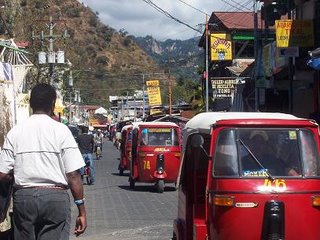
We needed five Tuk Tuks, since they seat at most 3 people. Samantha Loia, Moriah Hurst and I piled into one. We are three pretty average-sized people, but it was a pretty tight squeeze. I’m pretty sure that if our Tuk Tuk had been hit by a Chicken Bus and we rolled down the side of the mountain, we would have still been wedged into that seat when they found us. Another interesting fact about Tuk Tuks is that if you cheer on the driver, he will pass the other slowerTuk Tuks in your party, and restore a small measure of the manhood you lost when holding tightly to your pillow in a public square.
While we were having fun with the Tuk Tuks, Hugo and Saulo were trying to rescue the Dodge Van. I don’t have pictures since I wasn’t there, but on the first attempt, the retrieval vehicle overheated. Then it ran out of gas. Lastly, it got a flat tire. The ancient Mayan traveling gods were indeed angry at Mennonites that day. Hugo and Saulo didn’t get the van into town until well after midnight and spent the night in a (real) hotel. Presumably, their only consolation for this Herculean effort was hot water for their showers.
By the next morning, the ever resourceful Carina, whose descent into ordinariness was quite brief, had again magically secured alternative transportation. We had two 12 person vans, which felt embarrassingly luxurious to us (we do remain Mennonite, after all). Here’s our van: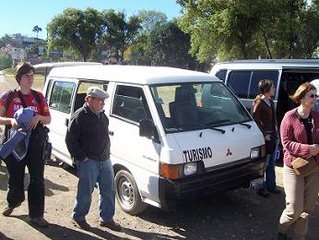
The only problem with the van was the “Tourist” sign plastered on the front. As if it were not already glaringly obvious that we were largely comprised of pasty faced gringos, we had a sign that pre-announced us as culturally insensitive and ready to exploit and/or be exploited. Nonetheless, we were glad to finally have reliable transportation.
After touring Santiago’s mudslide area and peace park, we planned to cross Lake Atitlan in rented boats to the town of Panachajelsomethingorother, which is a tourist shopping mecca. We were travel-hardened by then, and a boat ride across a lake seemed like recreation at this point. We took two boats, one of which was called “El Quetzel”, after either the national bird, or the national currency (which is named after the bird). They were basically little cigar boats, and we expected a nice, leisurely crossing of the lake: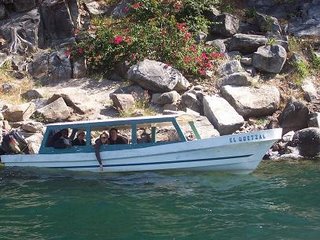
We didn’t sink, if that is what you might be expecting at this point. However, it was a very windy day. The wind produced pretty good-sized waves. The boats got thrown around a little. We took some videos:
As Gayle Gerber-Koontz pointed out, every time Jessica and Alissa screamed from the front of the boat, it was a good warning to lift up your body a little to save your lower back from the imminent high impact crash on the seat of the boat. Gayle bumped her head a few times on the top of the boat this way, but it seemed worth it.
Here’s a picture of the other boat in the water. I tried to get a picture of the 75 degree angle it seemed to achieve every now and then, but wasn’t able to capture it. Maybe it was my imagination, or the blows to the body I was receiving during the ride.
We made it there just fine though, without too many body bruises. We gave in to our tourist impulses, did some shopping and then left for “home” (Guatemala City) in our rented vans. The trip home was merely a boring four hour trip where we encountered no calamities except bad traffic. The rented vans couldn’t even manage to bump into each other, much less crash into anything grand and spectacular.
So, for those counting at home, that’s six official modes of transportation for the originally planned 3 hour trip to Lake Atitlan: Dodge Ram, Flete, Chicken Bus, Tuk Tuk, Tourist Mobile, and Cigar Boat. Kent Yoder, of bruised ankle fame, was able to score a seventh mode, due to his sore ankle: Travel by Shoulder. Overall, Kent was kind enough to physically embody the trip for us, as he limped from place to place without too much complaining.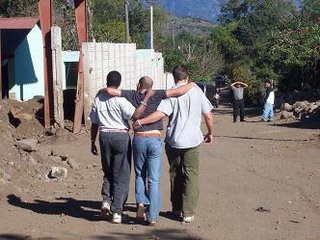
I hope none of my jokes about this trip indicate that I was unhappy about it. Even with a dicey digestive system at the time, I wouldn’t change anything about this particular trip. Only by having massive problems were we able to have the experience of touring the Guatemalan public intercity transportation system, which in hindsight, is actually better than in the US. If your van breaks down in the US, there are no Fletes or Chicken Buses to come pick you up for a few dollars to the next town. Also, Santiago was a great town to be in - lots of great character and it doesn’t seem to suffer from tourististia too much. I plan to leave my pillow at home though for the next trip.
If this story were to have a moral, it would be this: Having large numbers of people who can’t afford their own transportation works to the advantage of those who do have sketchy, unreliable transportation.
UPDATE 1/24/07: We are back home now, and on the way home from the airport we rode in the 15 passenger van here at AMBS. It seemed cramped on the way to the airport at the beginning of the trip. Last night, it seemed like an unnecessary luxury. Three weeks can certainly change's one perspective.
Posted by
Dan S
at
1/22/2007
4
comments
![]()
Labels: Guatemala
Tuesday, January 16, 2007
Too Much Information, Running Through My Head
My brain is officially full. Information is leaking out my ears, down the side of my bleary-eyed face. If my brain were a stomach, it would have just eaten a plate of spaghetti the size of a hubcab, and is now expanding uncomfortably, causing my lungs to pant. I don't know what other part of me would be my lungs in this metaphor, becaus my brain is usually the one to figure these things out, and there is no room left at the inn for unmixed metaphors.
We are travelling for the next two days, and I am incapable of any meaningful output until after the trip. I've probably posted too much anyway, flooding the market on Dan Observations On Guatemala so that you could probably pick one up at the mercado for a few Quetzals from indigenous craftspeople. Please do. They need the money.
Posted by
Dan S
at
1/16/2007
0
comments
![]()
Labels: Guatemala
Saturday, January 13, 2007
Guatemala Contrasts
I was able to borrow a USB device that copies camera pictures to my laptop (woohoo!), so now I can add pictures to blog entries while here in Gautemala. Good thing too, because pictures are important for this story.
The contrasts below are not poor vs. wealthy, but between miserable vs hopeful. Guatamala City is very hilly, and there are a number of large ravines where people with no where else to go simply start putting up corrugated tin houses. If they are not driven out, they eventually replace the corrugated tin with cinder block.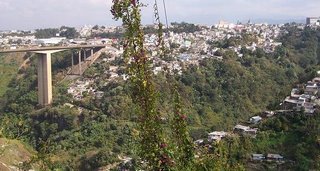
This set below was taken from the Guatemala City town cemetery, which is right next to the town dump. The town dump is in the same ravine as the picture above, but further downstream. As you can see, the trash is dumped into the ravine, and some dirt is put on top, but most of it is exposed.
If you look more closely, you can see people waiting for the garbage trucks to empty out, so they can pick out stuff they can use: We saw the movie "Romero" the other night, and one of the scenes had someone being dumped in a trash pit exactly like this. At the time I thought it was just Hollywood creative license, but as I stood there, it did cross my mind that it would be an ideal place to dump an unwanted body.
We saw the movie "Romero" the other night, and one of the scenes had someone being dumped in a trash pit exactly like this. At the time I thought it was just Hollywood creative license, but as I stood there, it did cross my mind that it would be an ideal place to dump an unwanted body.
The eerie part was the turkey buzzards, which are the black specks in the sky in the pictures. It felt like a scene out of some Goth Hitchcockian thriller, except with young Mennonites standing around, taking pictures. They filled the sky and also perched ominously on gravestone crosses (the buzzards that is, not the Mennonites, who, as I already said, were standing around taking pictures).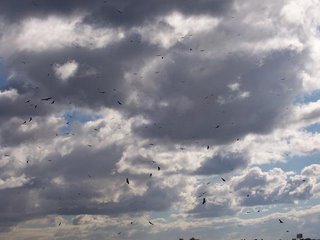
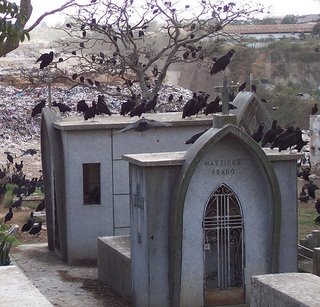
If you haven’t guessed by now, the pictures above represent the “miserable” side. For the hopeful contrast, we visited UPAVIM (United To Live Better), which is a woman’s cooperative in one of the poor barrios. Here’s a picture of the neighborhood: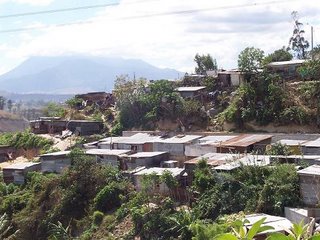
The UPAVIM building is below. It was started in 1990 by women. Many of the women in the neighborhood are single or suffer from domestice violence and when they go to work, their kids have to be shut in their houses all day, or they just run around in the streets. Other problems in the neighborhood are typical for areas of extreme poverty: gang violence, alcoholism, illiteracy, lack of health services, and lack of funds to send kids to public school (where families usually don't have enough money to pay for books and fees, even for public school).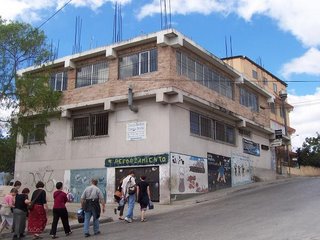
UPAVIM started as a “healthy babies” program, but they started making handicrafts for fair trade organizations like Ten Thousand Villages, and this allowed them to start providing other services for the community around them. It is amazing what they are able to accomplish by selling handicrafts which are fairly traded:
- Pharmacy and clinic for health care
- Nursery school for babies
- Montesorri school for elementary kids
- Scholarships for books and fees for public schools
- Tutoring for neighborhood kids
- Healthy babies program, which monitor babies for health problems
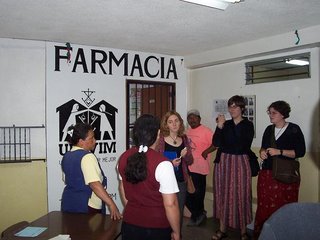
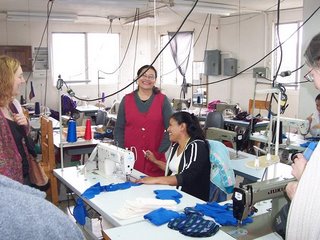
I’ve always been supportive of Ten Thousand Villages, but have also become a little more ambivalent about it over the years, because at its root, it still relies on consumerism to make people’s lives better. There has to be a more sustainable way to help others than to "shop for justice." Nonetheless, seeing purchases make a real difference in the lives of desperately poor people underscores that even though it isn’t perfect, it seems to be effective.
So, for those of you who like clear, unambiguous morals at the end of your stories, and don't yet feel like this story has sufficiently hit you over the head with a hammer: The moral of this story is to buy all your stuff at Ten Thousand Villages, or poor people will be forced to eat garbage.
A corollary moral might be: Everytime you drink a cup of coffee that isn't part of the Fair Trade program, somewhere in the world a puppy will die.
Other morals will be left as an exercise to the reader.
Posted by
Dan S
at
1/13/2007
3
comments
![]()
Labels: Guatemala
Thursday, January 11, 2007
Terrorism Is the New Communism
One of my all-time favorite quotes is from El Salvador Archbishop Oscar Romero, who said “If I feed the poor, they call me a saint; if I ask why they are poor, they call me a communist.” I always chuckled at this, because I get called a communist every now and then when advocating for more equality in social structures. I see it as comical because it is such a lazy debating point, similar to calling pacifists traitors or using the term “politically correct” to mean “I don’t have a real argument, so will try to smear you with an unfashionable label.”
However, I’ve learned here in Guatemala that being called a communist in Central America during the cold war was no laughing matter. Romero was gunned down while celebrating mass in 1980 precisely because his advocacy for the poor was too much of a threat to the rich and powerful. In fact, Guatemala is just now emerging from under the shadow of a 36 year civil war that began as a result of powerful people being threatened and fighting back with the word “communism” (and, of course, a huge arsenal of U.S. weapons).
The civil war came about because of the two biggest problems in Guatemala, which still exist today: land reform and taxes. Most of the land is currently owned by a small number of wealthy people and foreign corporations: 6% of the people own 76% of the land, which includes, not surprisingly, the best agricultural land. One interesting demographic here is that 55% of the people here are Mayan Indians, who depend on the land for survival, and whose land has been systematically stripped from them over the centuries.
The other side of the problem is taxes. As in, rich people don’t pay much in taxes here, and there isn’t much of a middle class, so the state has very little money to help with social services. Without land to support themselves through agriculture, or decent jobs because there is no middle class or government social services to help, the poor are squeezed into whatever they can get. This often includes sweatshops jobs where their treatment is shameful (so we in the U.S. are ensured a steady supply of cheap t-shirts). They are happy to have jobs in the same way that you would be happy to get breadcrumbs when you are starving. It is no wonder that anything of value here is barricaded within a compound protected by large walls with razor-wires on top.
The irony is that these were exactly the same problems that existed in the 1950s, when democratically elected President Arbenz decided to institute land reform, so that more people could own land and support themselves. However, he came up against the almighty United Fruit Company, who had a number of Eisenhower administration officials on their board, including John Foster Dulles, the secretary of state. UFC owned a huge amount of the richest land in Guatemala (see Open Veins for how that might have happened). Arbenz passed a law mandating they sell any unused, idle land at the price they claimed on their taxes. They complained that the value they reported on their taxes was only 1/10th of the actual value. Arbenz said too bad, they should have claimed the real value. So, Dulles pronounced them communists. The CIA came in, overthrew Arbenz, and replaced him with a dictator that would be more sensitive to US economic interests. Guatemalans, who merely wanted to control their own resources to help their own people, were rewarded with a civil war that produced genocide on an off for 36 years, with the government being steadily supplied with US arms and personnel.
It is old news by now that terrorism is the new communism, but being here has reminded me how freaked out everyone used to be about communism. This helps explain the current hysteria surrounding terrorism. People are apparently easy to scare and those in power have no trouble whipping up fear to command the obedience of most people. Simply replace the word “communism” with the word “terrorism” and go on as before. So, if we label someone a terrorist, we don’t need to provide proof of their wrongdoings or follow the rule of law. If we need control of another country’s resources, we call them terrorists and invade their country. If we want to expand government’s power to spy on citizens at home, we simply claim that we need to do it to fight terrorists. Note that I’m not saying that Soviet Communism and Terrorism were/are not threats to the well being of the world. It is just that they are used to support all kinds of nefarious deeds that have nothing to do with fighting communism or terrorism, and cause even well-meaning people to enact misguided and counter-productive measures.
Luckily for Central Americans, they have been able to end their civil wars and at least stop open conflict since the word “communism” lost its teeth. This has helped development of these countries, but it hasn’t made many injustices go away, since the problems of land reform and taxes have not gone away. One would think that with the U.S. distracted by trying to control oil instead of fruit and coffee, and with a number of South American countries paying closer attention to the needs of their poor, that things will improve. Possibly, but remember that Bush tried to overthrow democratically elected Hugo Chavez in Venezuela a few years back, and that the phrase “war on drugs” is almost as effective as the word “terrorism” in maintaining U.S. hegemony in the region. Still, things are better than they were. Hopefully someday the situation can go from “not openly massacring people” to “actual structural changes that enrich the lives of ordinary Central Americans”.
Posted by
Dan S
at
1/11/2007
4
comments
![]()
Labels: Guatemala
Wednesday, January 10, 2007
Open Veins
I am getting a crash course in Latin American and Guatemalan history while I am here. One of our initial readings is “Open Veins of Latin America” by Eduardo Galeano, a classic written in the early seventies. It is at times both lyrical and scathing.
It reminded me a little of one of my favorite books, “Guns, Germs and Steel” by Jared Diamond, which provided a framework to think about huge historical forces beyond the control of individuals, and basically changed how I thought about history. “Open Veins” is doing this for me in terms of how to think about Latin America.
If the theme of “Guns, Germs and Steel” is that environment is destiny (the physical location and resources available to a society largely determine how successful it will be in competition with other societies), then Open Veins’ theme is that having resources that others want invites violence and oppression from more technologically advanced societies. Both books must over generalize to tackle such broad topics, but it is their very expansiveness that makes them valuable as frameworks.
Galeano is nothing if not quotable. He says that Latin Americans suffer from the “curse of their own wealth” and that “our richness has always generated our poverty for nourishing the prosperity of others”. Latin America “continues to exist at the service of other’s needs, as a source and reserve of oil and iron, of copper and meat, of fruit and coffee, the raw materials and food destined for rich countries which profit more from consuming them than Latin America does from producing them.”
What is he talking about? Latin America teems with natural resources, so it is wealthy in terms of raw materials. But he goes through case after case, starting with the initial conquistadors through the modern era where outside countries have conquered and enslaved them so that the flow of cheap raw materials can continue unabated to enrich the occupiers. It started with gold, then silver, then continued with copper, nitrate, tin, sugar, coffee etc. For example, modern day coffee farmers make a pittance on the coffee they grow, which is usually not on land that they can ever own. Most of the profits go to middlemen, often large multinational corporations, who often own the land as well. And, depressingly, this is progress compared to the atrocities that happened during colonization.
Another theme of the book is that there are always people will to betray their community to enrich themselves. Conquerors need merely find those people, pay them off to be their strongmen, and they will be happy to live in mini-splendor amongst poverty and suffering, even though the lion’s share of the profit goes elsewhere.
Galeano lays out a convincing case, but it is a depressing one. Having access to raw resources can either enrich or enslave those who live near them, depending on whether they can protect themselves from inevitable invasion. Latin America over the centuries has been plundered because it did not have enough power to defend itself, and has remained beholden to Western powers.
This is yet another example of imbalance in power leading to great suffering and injustice. Those with power can’t seem to stop themselves from taking advantage of those without power, and the only way to reduce or eliminate this condition is to work towards balancing power.
One small way to help will make my wife happy. She is religious about buying fair trade coffee, and fair trade goods in general are something that helps. They come from farmers who manage to get small plots of land to farm on, and the profits primarily go to the farmers themselves. Same goes for fair trade crafts at places like 10,000 villages.
Another surprising fact is that immigrants sending money home to their families is the number two factor in Guatemala’s GNP (or GDP or money from exports or something like that). I had no idea how important immigrants in the US are to the lives of people here. So, supporting sane immigration policy is also a good place to start.
Unfortunately, these small, painless steps don’t completely make up for 500 years and counting of oppression. In fact, they are pretty pathetic in the grand scheme of things. But, they are at least headed in the right direction.
Posted by
Dan S
at
1/10/2007
4
comments
![]()
Labels: Guatemala
Monday, January 08, 2007
Guatemalan Prayer
We attended a Guatemalan Mennonite church yesterday. It was on the small side, perhaps 50 people, and wasn’t much like other North American Mennonite services I’ve been to. For one thing, the only Yoders and Benders there were the ones we brought (Kent and Alissa, respectively). However, it was not terribly different from black church services I’ve been to in the US, where there is a lot of good, soulful singing at the beginning, a warm welcome for visitors, an offering, and a pretty long sermon. It was longer for me than most because I don’t understand Spanish so well, so I had to rely on feeling the spirit of the congregation rather than any actual cognitive input. But the spirit was strong, and it provided pretty good therapy for an uptight, white guy who likes to think like he’s in control and knows what is going on.
The one aspect that was new and meaningful to me was the congregational prayer towards the end. The pastor started the prayer, but then everyone else jumped in with prayers and pleadings and praises. I think. Again, it was all in Spanish. But it was a new experience – being inside a cacophony of voices, soft at first, but growing ever louder and urgent, seeking God. I imagined this is what it would be like to be God – to hear the endless cries of his children. It was great to part of it, but I later thought that it would probably suck to be God. So many people need so many things, usually because so many other people are cruel or mean or uncaring. Of course, I suppose it would be worse if there was nothing but silence.
In any case, I think we should do sharing time in my own congregation that way – everyone just start talking and sharing at the same time, with those who really want to be heard having to yell. It would never drag on for 20 minutes that way – 3 minutes, tops.
Speaking of prayer, I re-learned a great meal prayer that I had heard once before but forgotten. There is a tune that goes with it, but it might only work in Spanish:
Thank you God for our food
Give bread to those who hunger;
and a hunger for justice for those who have bread
Posted by
Dan S
at
1/08/2007
1 comments
![]()
Labels: Guatemala
Sunday, January 07, 2007
Guatemala Here I Am
I have a confession to make about my Guatemala trip (to attend a three week class at the Anabaptist Semilla Seminary). When I signed up, it wasn’t because of a burning desire to learn more about liberation theology or because Guatemala was on the list of places I needed to see before I die, or even because I wanted to apply my minimal talents and intellect to the problems of Central America. Instead, I can trace it back to Ken Humphrey, who went on and on and on about his enriching and valuable trip to the United Nations. Ken is a fellow AMBS sabbaticaller, Irish Catholic-Protestant Reconciler, and font of all knowledge concerning European sports. We became good enough friends that I've earned the right to be called a mucker by him, which is apparently a good thing in Ireland. Anyway, the UN conference he went to was one I could have easily attended, if I had gotten my act together, so his glowing review of it burned like hot coals in my flesh.
To add insult to injury, about a month later I again failed to attend a Mennonite writer’s conference that I wanted to go to. I later learned that my friend Dave Wright (poet, dreamboat English professor, and ideal house renter) had led some workshops there. He was very diplomatic about what a great conference I missed, but I just felt like a dope for not going. In the interest of full disclosure, I must admit that the reason I missed the writer’s conference was that the week before I went to the Ohio State-Indiana football game with the very same Ken Humphrey, and had used up all my spouse points to watch my beloved Indiana be ritualistically sacrificed to the BCS gods (44-3).
So, I wasn’t going to miss out again on another cool trip, regardless of what it was. That defines a lot of my life, by the way. I am spurred to action by the great motivator of Not Missing Out. For me, it always seems to come back to issues of being a middle child. In any case, Guatemala was the next opportunity for travel, so hellooo Guatemala. All I needed was to backfill valid and honorable reasons for going. Luckily it did happen to be true that I wanted to learn more about liberation theology. I also wanted to immerse myself in a different culture – I love being challenged about my comfortable, middle class, white American life. I also thought it would give me space and perspective to make some progress on what I should be doing in life. It’s all about me, after all.
So, I had very few expectations about coming here. Sometimes not having expectations is a good thing. So far, it has been like a movie you walk into knowing very little about and turns out to be the best movie you’ve seen all year (which in this case, isn’t hard, since the year is only 7 days old, but still, it’s been an enriching few days).
What I didn’t expect was to be so reminded of Venezuela. Latin American countries are obviously not identical, but they are more similar to each other than they are to the places I visit in the US, and I haven’t traveled internationally all that much. But I did live in Caracas when I was 12 (my Dad worked for International Harvester as a truck sales engineer and was transferred there for nine months in 1975-76).
On the way from the airport to the seminary, all the sights, sounds, and smells of Latin America came rushing back to me. The white stucco houses with red clay roofs, barricaded behind large walls. The corrugated tin houses and roofs on hillsides where the truly poor eke out an existence. The Spanish-style churches dotting every few blocks. Open air hallways, since enclosed walls are not necessary in this climate. The rat-a-tat-tat of Spanish speakers having animated conversations. The smell of sidewalk food containing I’m not sure what, but boy does it smell good, and might even be worth 3 days of diarrhea to try. And, of course, road signs and rules that are “only suggestive”, as quipped by Carina Soderlund, our first-rate Semilla guide, who can put a 15 passenger van in places I wouldn’t try putting a Miata.
Despite not having clear, success-oriented goals while I am here, I need to make the best of my time because I’m using up the next six month of spouse points by being here. My lovely but unfortunate wife is suffering by threes at home while I am here. She is taking a 3 week Anabaptist history and theology class which requires 3 papers (and a big test), while she is taking care of all 3 kids solo. Plus, just to rub it in, her birthday will take place while I am away. Since there is no way I can help her while I’m here, my only strategy is to simply make it worthwhile, and come back all smiles and energy to take over parenting for the next few months.
So far, the landscape is beautiful, the weather is perfect and the food is excellent. Unfortunately, the people are mostly oppressed, which I will talk about more in later, fun-filled posts.
Posted by
Dan S
at
1/07/2007
2
comments
![]()
Labels: Guatemala
Tuesday, January 02, 2007
Guatemala Here I Come
I signed up for an interterm class on Liberation Theology in Guatemala and leave tomorrow with 12 others for a 3 week stint in Guatemala City at the Mennonite Semilla.
I've been scurrying around trying to pack everything I'll need, which includes more dressy clothes than I am used to wearing (they dress more formally down there, so my usual slobby bluejeans are discouraged). I tend to underpack clothes and overpack reading materials, so I'll need to cut down on the number of New Yorkers I want to catch up on.
Here's what I know about Liberation Theology: God is on the side of the oppressed. I hope to learn why in the next three weeks.
I'm told there is internet access at the seminary there, so I don't know whether my blog output will increase or decrease while I'm there here. Statistically speaking, it would be hard to decrease blog output, since I managed only one post in December, and this post technically counts as a January post. But, I'm hoping there will be some time in between readings, class sessions, and day trips to see Guatemala to do a little blogging.
Posted by
Dan S
at
1/02/2007
4
comments
![]()
Labels: Guatemala
